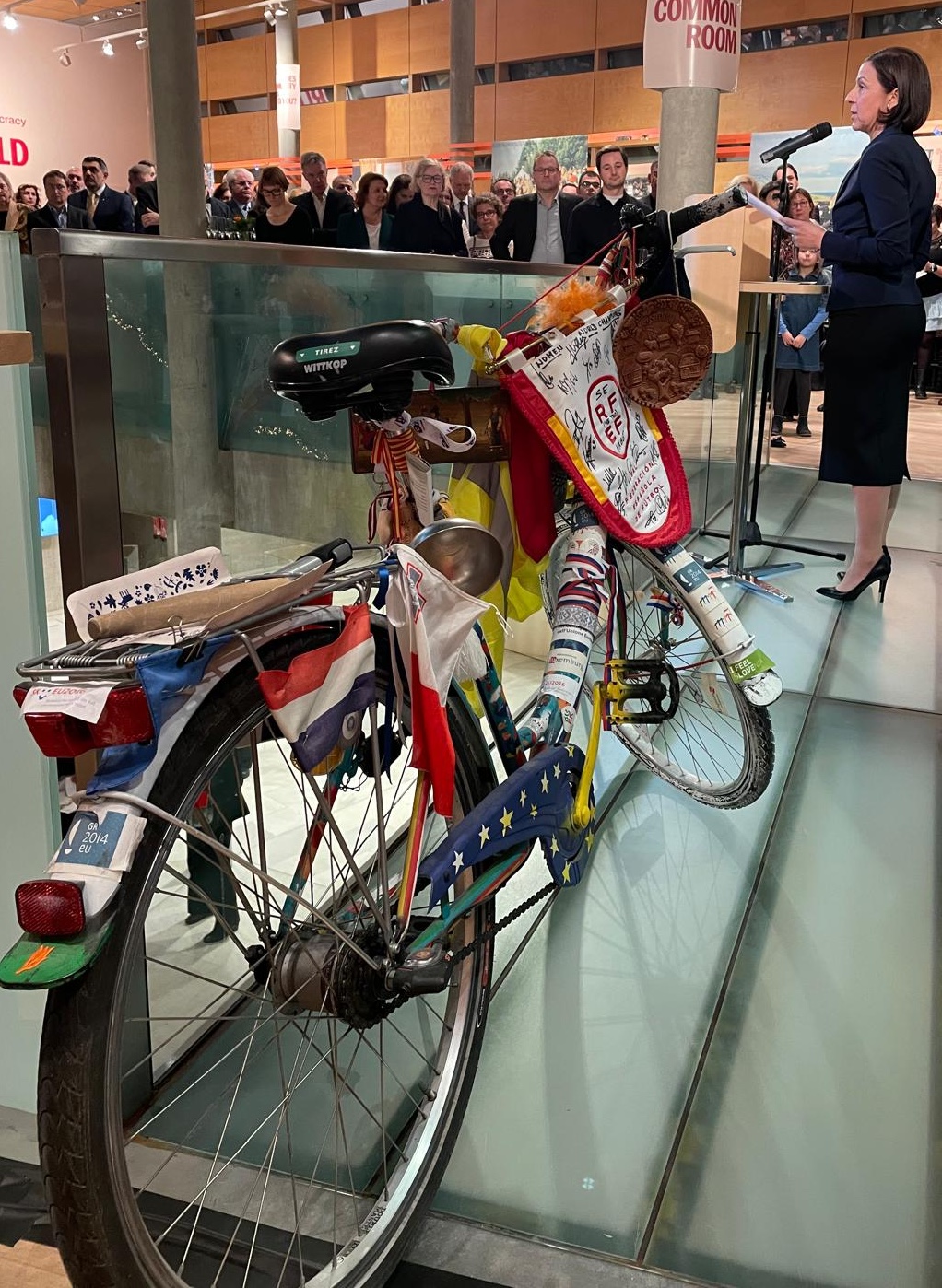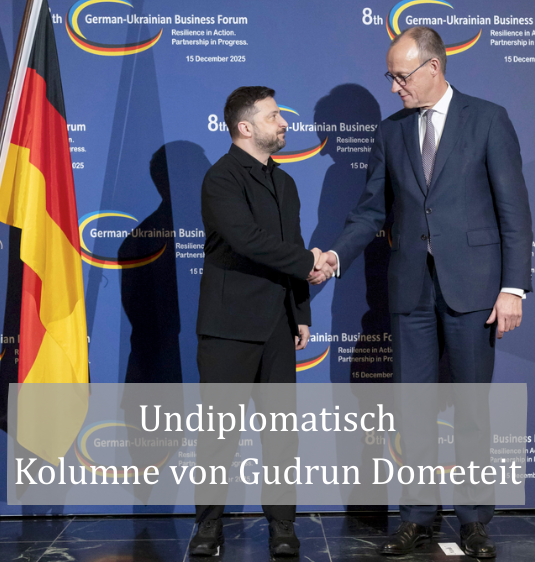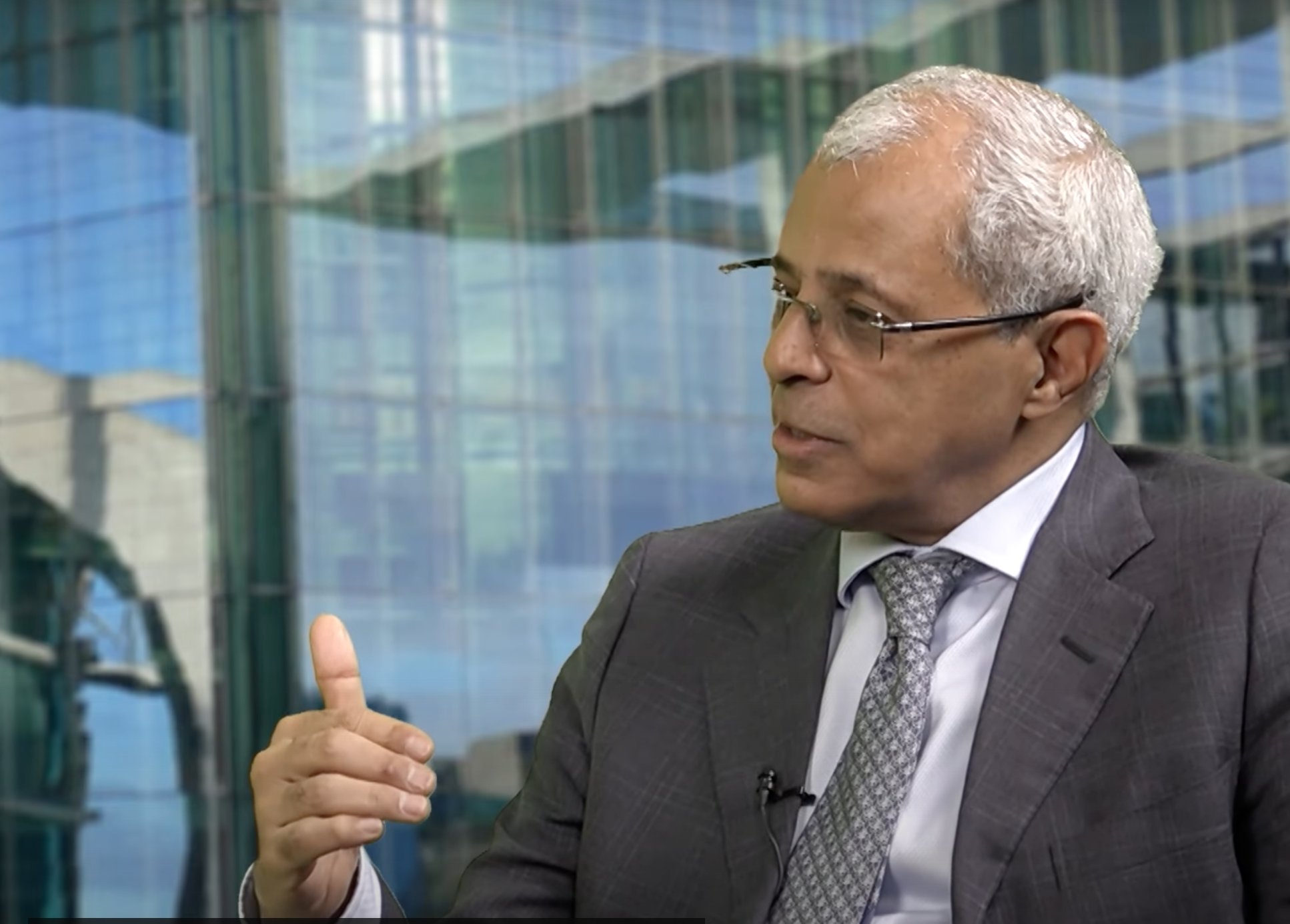diplo.news
“We have almost always let the others do it.”
Interview by Gudrun Dometeit

A month has passed since the sudden fall of the Assad regime in Syria. Have they now gained a clearer picture of what is happening there? Can the new rulers of the Islamist HTS militia and their leader Ahmed al Sharaa be trusted?
In the initial phase, al Sharaa actually said the right thing and did the right thing. However, there are now some signs that need to be followed closely. For example, that he obviously doesn't shake hands with women such as the German Foreign Minister — an expression for a more conservative interpretation of Islam. And we also hear that there are instructions from the Ministry of Education to shape the educational curriculum in a religiously conservative way. On the other hand, he has appointed three women in management positions, including the President of the Central Bank and a female governor. So these are mixed signals.
There have been outrageous violent crimes in Syria, by the Assad regime, but also by the Islamists. Is it even conceivable that the HTS, which was closely linked to the al-Qaeda terrorist group, will at some point come to terms with its own acts of violence as part of a reconciliation process? However, the fact that a former Sharia judge who executed alleged adulteresses was appointed Minister of Justice does not exactly speak in favor of this.
I have the impression that there are also directional struggles on the part of the new rulers, and one can only hope that the more moderate groups prevail. There are, of course, attempts to prosecute the perpetrators of the Assad regime now. A leading Alawite general has just been arrested. The question of what is wrong with the victims on the other side is still open. We must carefully monitor this as we come to terms with the past.
Is there a model that could serve as a model for the reconciliation process between the various religious and ethnic groups?
There are various patterns - South Africa, San Salvador, Tunisia. But you should be realistic about that. A reappraisal like ours after the Second World War and after the fall of the Wall, in a completely different cultural circle, is unlikely to take place in Syria. But it's about holding people accountable and sending out signals that this can affect everyone. In my opinion, perfect legal processing is unlikely.
What speaks against another civil war? A major demilitarization would be necessary to prevent this. Al Sharaa has announced its intention to integrate all armed groups into a joint national army. Can that be achieved?
It is possible if minorities trust that the new central government will protect their rights. If they feel that disarmament only serves to make them defenseless and impose their own ideas by force, then it won't work. Not only we, but especially the Syrians themselves are now watching the different signals very closely. It is now up to al Sharaa and ultimately us Europeans to steer this process in a direction that is acceptable to all sides.
Many fear that the so-called Islamic State (IS), which still has numerous fighters underground, could now use the transition phase for reconquests and terror. Is that really a ticking time bomb, as some think?
That is definitely a risk. There are IS camps in the Kurdish regions, which are still controlled by the Kurds. However, they are under pressure by the Turks. ISIS also controls areas around the oasis city of Palmyra, albeit largely deserted. So it will probably seize its opportunity. However, it has few supporters in relatively moderate Syria. That is why it will probably not be so easy for IS. Many reject attacks on Syrians and Syrian institutions; institutions would defend them in case of doubt.
What does the bombing by Turkey, which would prefer to disarm and drive out the Kurds in the northern border region, mean? The Kurds are something like the last bastion in the fight against IS. Isn't such interference absolutely fatal? Is it possible to influence Turkey?
That's exactly the dilemma. According to my observations, the Turks usually respond to such questions by saying that they don't consider the threat from IS to be that great. But I think that's a dangerous assessment and more a case of optimism for convenience. It is therefore important that the Kurds ultimately integrate into a Syrian state that takes account of both Turkey's and the Kurds' interests. If this does not succeed, if the IS camps are no longer guarded and the inmates are released without integrating the women, mothers and their grown-up children, most of whom are close to IS, then there will be a major problem.
Around 900 US soldiers are still stationed in the Kurdish region. After Donald Trump's statements that Syria is none of the USA's business, do you think it is possible that the new US administration will withdraw these troops? What consequences would that have for Syria and the Middle East as a whole?
That is one of the many unknowns of the Trump administration. In any case, a withdrawal of American troops without any regulation as to who will take over their duties would send a fatal signal. I can only hope that Trump will finally recognize the danger that would arise as a result: increased terrorist attacks not only in Syria, but possibly also worldwide. How to deal with the Islamists is a very virulent question for us Europeans and for the Syrian state. After all, you can't leave them in a camp for the next 100 years.
In addition to Turkey, there are a whole host of other players exerting pressure on Syria - Israel, Iran, Russia. Is stabilization even possible? Israel has occupied the buffer zone on the Golan, and Iran, Assad's former protecting power, will not stand idly by and watch its influence fade.
In my opinion, the Syrians want to stay together. This is different from Libya, where there have always been tendencies of divergence and competition between East and West. The majority of Kurds also apparently want to remain in a Syrian state, possibly with an autonomous status. Dividing the country apart will therefore be difficult. In addition, the players you mentioned are highly unpopular in Syria. Iran and Russia are rightly regarded as long-standing supporters of the Assad regime. Most people are happy that they are no longer there. Israel was never seen as a positive factor but as an occupant. At least for now, these external players therefore have no chance. This may change as internal conflicts become larger. Much now depends heavily on Germany and the European Union as to whether they play a constructive role in the eyes of the Syrians. That is why we simply cannot leave Syria to its own devices.
Russia has two military bases in Syria, whose continued existence it is apparently negotiating with the new rulers. How strong was the influence of Moscow, which caused Assad's fall to take place?
Russia's role in Syria was actually always major, because it was a socialist brother country. That is why Syria also had good relations with the GDR. Assad's Baath Party is ultimately modelled on the CPSU (Communist Party of the Soviet Union) and the SED (The Socialist Unity Party of Germany). Many Syrians studied in Russia and the former Soviet Union. There were numerous marriages, and many Russians lived in Syria. That is why there are traditionally close contacts. However, the support of Bashar al Assad has cost Russia an enormous amount of sympathy. The country will not voluntarily relinquish its influence, but is now likely to act very carefully so as not to completely lose it.
Who is the biggest loser, the biggest winner after this surprisingly rapid collapse of the authoritarian Syrian regime?
The big losers are Russia and Iran, the big winner is Syria, possibly Israel and possibly Lebanon.
Why Lebanon?
In recent years, the country has been increasingly dominated by Iran and Hezbollah. The latter was a state within a state, the actual government barely able to act anymore. Iran's support for Hezbollah, in turn, was fueled by the conflict with Israel. The organization is now severely weakened, as is Iran, and there is a chance that Lebanon will use this vacuum and regain full control, particularly in the south. That is why this country is a very important partner for us; its stability also has an impact on Syria. Israeli troops have also begun to withdraw from southern Lebanon. However, the Lebanese Army must also be able to move forward. However, it is weak and needs additional weapons and support. We Europeans, including Germans, must consider how we can strengthen them. We will also have to participate in the reconstruction so that Iran does not do it. The people there will look at who is helping them and they will thank them.
No country in the Middle East appears to be viewed in isolation. Fighting has been going on in the region for decades, and one gets the impression that only armed force counts as a means of foreign policy. Could the time for diplomacy finally strike again?
At least there's a chance for that. We have three areas of conflict across the region. One is the territorial issue surrounding Israel, i.e. who owns Gaza, who owns the West Bank including East Jerusalem, who is the Golan, what happens to the people there? Then there is the conflict between Iran and the Gulf States, which is also due to religion - Shiites versus Sunnis. And there is a socio-political struggle between Islamists, very Islamic groups and modernists. These three conflicts run in parallel. These countries must conduct the socio-political debate themselves. But the geopolitical disputes are of course also of interest to us Europeans. That is why Syria is so relevant, because all three conflicts are coming together there as if under one magnifying glass.
The Syrian transitional government says that it has looked at developments in Iraq, Libya and Afghanistan in recent years in order to avoid the mistakes that were made there. What mistakes do you think should not be repeated in the reorganization of the region?
In Afghanistan, the population was much more conservative than expected, meaning that modern external influences were only supported by a relatively small proportion of people. In addition, Pashtuns, Tajiks and the Iranian-born part of the population had a difficult relationship with each other. In Iraq, following the death of Saddam Hussein, the Americans' attempt to involve everyone failed because the Shiites sought their place as the largest population group and had too little regard for others. And in Libya, there was no visible leader who could fill the vacuum after Gaddafi. In Syria, on the other hand, there is a clear leader who has acted surprisingly confidently so far. Whether it will be able to bring all religions and ethnic groups together will be a key question for the country's future.
In Libya, the Europeans have not covered themselves in glory either. They could not agree on which of the groups they should support after Gaddafi's death.
They initially left the Libyans to their own devices because they did not want to repeat the mistake made in Iraq. The approach failed because the groups did not come together. That is why they tried to organize the process from outside, through the United Nations, by creating a jointly recognized government. This also failed because the remaining groups did not agree to it.
It doesn't look like such a development in Syria right now, because everyone has so far acknowledged that they are prepared to recognize al Sharaa's claim to leadership under certain conditions, namely to protect their own interests. Whether this succeeds will depend very much on how skillfully he goes about it.
What exactly could Germany and Europe do to gain more influence in the Middle East in the future?
First and foremost, we have to accept that this region is in our interests and that we have a will of our own to shape it. So far, we have almost always stayed out of it and let others do it. This realization must prevail, especially in Germany. We also need to exert an influence that is perceived as positive by the Syrians and the region. I say that deliberately because the influence of the Americans in Iraq was not seen as positive. And how can we exert influence? First of all, by acting together as Europe. The joint visit by the German and French foreign ministers to Syria was an important signal. In addition, the degree of our support should also depend on the degree of political development. In other words, support only if what the majority of Syrians want is done: rights for minorities, religious groups and women. And then, of course, we must help the country to get back on its feet economically. As in Germany after the Second World War, democracy only has a chance if there is an economic improvement.
However, the gesture of the joint visit, i.e. by Foreign Minister Annalena Baerbock and her counterpart Jean-Noël Barrot, to Syria a few days ago was somewhat lost in the public discussion about the lack of handshakes and the appropriate clothing on the part of the Foreign Minister.
Absolutely. This is a very good example of a possible lack of understanding of geopolitical gestures among the German public. People tend to focus on such minor issues instead of highlighting the major geopolitical connections.
Don't diplomats have to follow something like Islamic etiquette during such visits? In terms of clothing, for example. Tight jeans for women are not acceptable.
Yes, obviously not. But we shouldn't overestimate that now either. Al Sharaa's refusal to shake hands was also certainly a gesture by the ruler towards the Foreign Minister, which, in my opinion, was unfortunate. But what is decisive is how he deals with minorities and what the role of women looks like in reality. And the gesture made by France and Germany deserves to be given much more prominence. The EU is constantly criticized for not getting things done. Now we're doing something really fast and very early, and no one jumps on it because it's easier to see with the handshake or the clothes.
Keyword economic aid. Doesn't it ultimately boil down to the EU paying for reconstruction, but without gaining any significant political influence? After all, the EU has already spent 33 billion euros on supporting Syria since 2011. But the political processes are determined by others.
These 33 billion were paid without political conditions. Some of the EU support went through UN organizations in Damascus. This was the only way to reach the inhabitants in the area under their control. In doing so, we had to accept that some of the supplies were diverted to the regime. We did not do this as a political consequence, but continued in our own interests in order to reduce the number of refugees from Syria. However, we will now have to ensure that the size of our commitment goes hand in hand with Syria's political development. However, we also have an interest in financing stability in order to be able to control the flow of refugees more effectively.
Did I understand you correctly earlier that Europe should also supply Lebanon with weapons as part of the reorganization of the region?
I am of course aware of Germany's sensitivities with regard to arms supplies. But if we take a sober look at the situation and want the Lebanese army in the south to actually represent a power factor vis-à-vis Hezbollah, this will have to be achieved not only with helmets but also with weapons. We must then address the question of whether German weapons should also be supplied and whether this will strengthen the Lebanese army vis-à-vis Israel. Whether Germany supplies these weapons or this happens in a European context, we should not oppose this in any case. We support the Lebanese navy, but we have to consider whether we should go further. If not, then we are leaving a vacuum into which Iran is pushing.
Under what conditions should Western sanctions against Syria be lifted? After all, the transitional government is led by an organization that is still considered a terrorist organization.
The restrictions should be gradually relaxed so that the new government can be shown again and again in which direction it should move. Syria can only develop economically if the country can also buy goods and obtain financing, if banks are allowed to make payments to Syria again. We now have to help shape it and then accept that things might not work out the way we imagine. Waiting until the others have done everything and then criticize — that would not be a responsible policy. In foreign policy in particular, you also have to try out certain things.
When can Germany's diplomatic mission in Damascus be reopened?
First of all, it is a question of safety. Damascus, however, is not unsafe at all. Then the embassy will probably have to be renovated. That will take quite a while. It won't even be possible to appoint an ambassador in this form, because an ambassador hands over his credentials to a head of state who doesn't yet exist. But you can show diplomatic presence in other ways by repeatedly sending diplomats from Beirut, Amman, Ankara or Istanbul.
Do you have ambitions of your own? As the last German ambassador in Syria, did the German government also ask you?
There are certainly contacts.

Dr. Andreas Reinicke has been managing the German Orient Institute in Berlin since 2022. He served as the last German Ambassador to Syria (2008 to 2012). In his diplomatic career, the lawyer included Head of Department of the Political Department at the Federal Foreign Office and Ambassador to Tunisia from 2014 to 2020.




